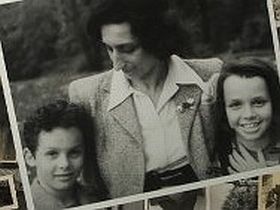


DOX Winter 2012/13

Beginning of January, no markets or festivals or workshops. Time to read the European Documentary Film Magazine, number 96. And time for a review of a magazine that has a strong and good focus on reviewing documentaries (critiques it is called) ”surrounded” by reports from festivals and industry related material, relevant as the publisher is EDN (European Documenary Network) and the majority of readers are film professionals, who are members of this organisation. (The membership includes a subscription the magazine).
First the positive and then the But…
Two great gifts for the reader. Buying the issue you receive a dvd with the film ”Tonia and her Children” (photo) by Polish master Marcel Lozinski, and if you go to the end of the magazine you will find an excellent essay by BBC’s Nick Fraser, a chapter from his book ”Why Documentaries Matter”, wonderfully, eloquently written and with clever observations on the approach to documentary filmmaking by Godard, Lanzmann, Ophuls and Maysles – with the 60’es and cinema vérité as the starting point.
There is a good article about war cameramen, an overview of new films about ”female muslim identity”, festival reports from Mumbai and Oulu, issue-led articles from workshops, an hommage to Sundance Institute, legal matters to be observed in the US, a photo section from Greece, it is all ok, maybe a bit more classical and predictable compared to other DOX magazines edited by Truls Lie, who previously has pleased this reader with interesting reflections in an essay format.
But… the main focus of the Winter issue is ”Pitching. What makes it a must for filmmakers”. 7 pages. The editor has got the idea that it would be good to have a database for pitches, he writes about that and he tests it by asking different involved ”players” if that is a good idea. Most of them say – surprise, surprise – that it is very important to meet each other before making any arrangements for financial commitment. At the same time as some say that the EDN online pitch on specific subjects like art and history is a good idea. Of course it is and of course the pitching for coproduction today, as we see it at the MEDIA-funded events in Europe and elsewhere, is more a promotion tool for projects than a realistic meeting point for picking up money. And of course the pre-pitch workshops are of value for the development of the projects. The 7 pages on pitching are too much vox-pop – x thinks this, y thinks that but x disagrees – where a much more deep journalistic investigation based on facts and/or case studies would have been the right way to go for a quarterly magazine. Who profits from the pitching sessions? How many and where? Which kind of films are pitchable? Are real coproductions totally away from the pitching landscape? Etc. etc.
http://reutersinstitute.politics.ox.ac.uk/publications/risj-challenges/why-documentaries-matter.html